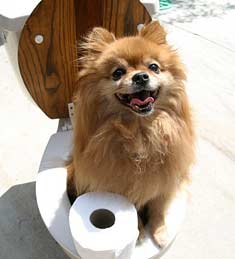What to do with Dog Doo
got poop?
Now, here are the acceptable methods of disposal:
Throw it in the trash, provided your municipality allows it. (Some towns have special disposal requirements.) Plastic doggie bags, plastic bags, or two, turns out to be the best thing to wrap it in (not, thank goodness, newspaper, which can be such a trial to use with messy poops), switch to reusable fabric bags for groceries. You can even buy corn-based, biodegradable doggie bags…The goal is to contain the waste in the event of a trash spill or landfill leak.
Use a poop collection service to pick it up from your lawn. This is equivalent to throwing it in the trash, but someone else does it for you. How convenient!
Flush dog (not cat!) poop away. One of the best ways to dispose of dog poop is flushing it down the toilet. (Cat waste is a different story — see below for why.) If your home is connected to the municipal sewage system, the poop will be sent to the waste water treatment plant, which will kill the bacteria and rid the water of nutrients and solids before letting it loose on the world.
Install an underground pet waste digester. This inexpensive device, also known as a doggy dooley, works like a small septic system for your pets, with a minimum of hassle for you. If I had a yard, this would be my disposal method of choice.
Now, here’s the scoop on cat poop. EPA brochures and a variety of other publications say you can flush it down the toilet, minus the litter. However, research suggests that the eggs of Toxoplasma gondii, a parasite found in cat poop, may survive the wastewater treatment process and contaminate waterways. While Toxoplasma rarely affects healthy people, it can cause defects and brain damage in babies whose mothers were exposed when pregnant. Brain disease can also develop in people with compromised immune systems. In addition, Toxoplasma has been shown to harm sea otters and may affect other wildlife as well. As the eggs can last for up to a year in soil, burying cat poop is also problematic. For this reason, researchers working in the field recommend keeping cats indoors and disposing of waste and litter in the trash in sealed plastic bags.
Authur Credit: Sheryl Eisenberg
First, let’s go over whatnot to do and why:
Don’t leave a dog’s deposits near the curb. It will get washed, via the storm sewer, into local waterways, spreading pathogens that can make the water unfit for drinking and swimming. When it decomposes, it will use up oxygen needed by fish and other aquatic life. Also, the nutrients it releases, combined with fertilizer run-off, may cause algae blooms that could make the water uninhabitable. Even if your town has a “combined sewer system” that sanitizes storm water before dumping it, heavy rains and snows can overwhelm the system, causing untreated discharges.
Oh yeah, leaving poop on the pavement is also unneighborly and, in many towns, illegal.
Don’t leave it on your lawn. It may wash into the storm sewer in a rainstorm, with the consequences described above. Besides, the pathogens in the poop are dangerous to kids playing in the yard — and anyone else who comes in contact with the ground. They can also contaminate edibles growing in your vegetable garden.
Don’t add it to your compost pile. The pile won’t get hot enough to kill the pathogens.

Request Information or Enrollment
Hours
Monday – Thursday 7:30AM – 10:00PM
Friday – 7:30AM – 5:00PM
4242 South Sheridan
Tulsa, OK 74145
Phone number: (918) 610-0027
Fax number: (918) 610-0029
ccc2018php7.wpengine.com/programs/veterinary-assisting/
facebook.com/communitycarecollege










the blog had a lot of inforamtion about why we should and always pick up after our animals and not leave it. my backyard is always picked up every couple of day’s. Thanks Danny for this infromation.
Thank you Joyce, I”m glad you took time to enjoy this blog information and happy to hear you scoop the poop every couple of days!
I liked the idea of the underground containment. I had not ever heard about that. I have my kids clean our yard up every night as we have several neighborhood strays that use our yard.